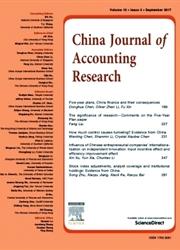Fiscal expenditure responsibilities of public–private partnerships and corporate innovation investment—evidence from prefecture-level cities in China
IF 4
Q2 BUSINESS, FINANCE
引用次数: 0
Abstract
Many public–private partnership (PPP) projects in China are facing increased fiscal expenditure responsibilities and weakened fiscal capacity, which may hinder investment in corporate innovation. Using data from Chinese prefecture-level cities and listed firms from 2014 to 2020, we find that PPP fiscal expenditure responsibilities negatively affect firms’ current and future innovation investment by reducing government subsidies and increasing corporate taxes. This negative effect is more pronounced when PPP fiscal expenditure responsibilities exceed a certain threshold. It is also stronger when local governments have higher levels of debt and lower central transfer payments. The effect is also stronger if the PPP project’s return mechanism increases the government’s future fiscal expenditure responsibilities, but weaker if the project’s operating model revitalizes government assets. The effect on private firms, small firms, high-debt firms, and firms facing strong financing constraints is more pronounced. From the perspective of fiscal capacity, this paper explains the underlying reasons why the effectiveness of government support policies for corporate innovation varies. Additionally, it examines the negative impacts of the financing-oriented PPP model on corporate innovation investment, providing empirical evidence to support options for optimal PPP strategies.
公私合作与企业创新投资的财政支出责任——来自中国地级市的证据
中国许多政府和社会资本合作(PPP)项目面临着财政支出责任增加和财政能力减弱的问题,这可能会阻碍企业创新投资。利用2014 - 2020年中国地级市和上市公司的数据,我们发现PPP财政支出责任通过减少政府补贴和增加公司税对企业当前和未来的创新投资产生负向影响。当购买力平价财政支出责任超过一定阈值时,这种负面影响更为明显。在地方政府债务水平较高、中央转移支付水平较低的情况下,它也会更强。PPP项目回报机制增加政府未来财政支出责任的效果也较强,但项目运营模式盘活政府资产的效果较弱。对私营企业、小企业、高负债企业和面临严重融资约束的企业的影响更为明显。本文从财政能力的角度分析了政府支持企业创新政策效果差异的深层原因。此外,本文还考察了融资导向的PPP模式对企业创新投资的负面影响,为PPP优化策略的选择提供了实证证据。
本文章由计算机程序翻译,如有差异,请以英文原文为准。
求助全文
约1分钟内获得全文
求助全文
来源期刊

China Journal of Accounting Research
BUSINESS, FINANCE-
CiteScore
4.70
自引率
0.00%
发文量
295
审稿时长
15 weeks
期刊介绍:
The focus of the China Journal of Accounting Research is to publish theoretical and empirical research papers that use contemporary research methodologies to investigate issues about accounting, corporate finance, auditing and corporate governance in the Greater China region, countries related to the Belt and Road Initiative, and other emerging and developed markets. The Journal encourages the applications of economic and sociological theories to analyze and explain accounting issues within the legal and institutional framework, and to explore accounting issues under different capital markets accurately and succinctly. The published research articles of the Journal will enable scholars to extract relevant issues about accounting, corporate finance, auditing and corporate governance related to the capital markets and institutional environment.
 求助内容:
求助内容: 应助结果提醒方式:
应助结果提醒方式:


